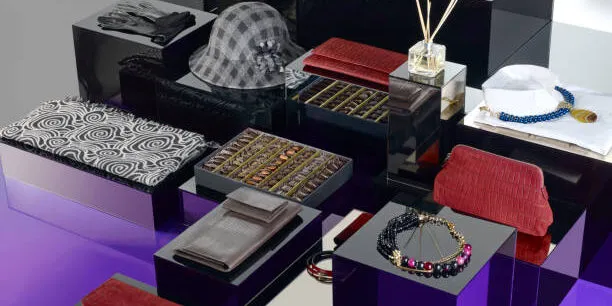
Saks Global Luxury Pulse Reveals Growing Demand for Personalization and AI in Shopping
Saks Global Luxury, the world’s largest multi-brand luxury retailer, has unveiled its latest Saks Global Luxury Pulse survey, offering deep insights into consumer sentiment regarding the economic landscape and evolving preferences for personalized shopping experiences. While the findings indicate that luxury consumers are feeling less optimistic about the economy, they remain highly engaged in Global Luxury shopping. A significant 58% of respondents reported plans to maintain or increase their luxury spending, and an overwhelming 94% expressed interest in engaging in activities that enhance the personalization of their shopping journey.
“At Saks Global, we are committed to reinventing Global Luxury shopping by curating fashion and experiences that cater specifically to each customer’s unique tastes,” said Emily Essner, President & Chief Commercial Officer of Saks Global. “The insights from the Saks Global Luxury Pulse strengthen our ability to deliver an unparalleled luxury experience. Despite some economic uncertainty, it’s clear that consumers remain deeply invested in luxury, especially when personalized services and AI-driven features enhance their shopping experience.”
Economic Outlook and Luxury Consumer Spending Trends
The Saks Global Luxury Pulse survey, conducted from January 16-22, 2025, indicates that while luxury consumers’ confidence in the broader economy is declining, they continue to maintain a positive outlook on their personal financial situations.
- Declining Economic Optimism: Only 45% of luxury consumers reported feeling confident about the economy, a 12-percentage-point decline compared to the same period last year and a 7-percentage-point decrease from the previous survey conducted in October 2024.
- Overall Economic Sentiment: 43% of respondents expressed optimism about the economy, reflecting a 5-percentage-point decline compared to both last year’s survey and the prior survey in October 2024.
- Personal Financial Optimism: Despite the drop in economic confidence, 65% of luxury consumers remain optimistic about their personal finances. However, this figure represents a 5-percentage-point decrease compared to the previous year.
- Key Drivers of Financial Concerns: The primary reasons for declining confidence include global conflicts and general economic instability, concerns that are more pronounced among those with an annual income exceeding $200,000.
These economic concerns have influenced Global Luxury consumers’ priorities for 2025. Financial security ranks as one of the top three concerns, alongside physical health and a strong desire to embrace travel and new experiences. Despite growing uncertainty, luxury spending remains strong, though with some variations across different income segments:
- Sustained Luxury Spending: 58% of luxury consumers intend to maintain or increase their Global Luxury spending in the next three months compared to the prior three months. This marks a 7-percentage-point decline from the October 2024 survey, largely due to post-holiday spending adjustments.
- High-Income Consumers Driving Growth: 63% of respondents earning over $200,000 plan to maintain or increase luxury spending, reflecting a 4-percentage-point increase from last year.
- Moderation Among Lower-Income Segments: 52% of those earning less than $200,000 intend to maintain or increase luxury spending, marking a 5-percentage-point decline from the previous year.
Evolving Shopping Preferences: The Rise of AI and Personalization
A key insight from the Saks Global Luxury Pulse is the increasing openness of luxury consumers to personalization and AI-driven enhancements in their shopping experiences. Consumers recognize that technology, particularly AI, can provide a more curated, convenient, and seamless luxury shopping experience.
- Preference for Personalized Shopping Experiences: More luxury consumers are engaging with personalized features and showing a greater willingness to adopt them compared to the previous year.
- Preferred Channels for Personalization: The majority of respondents indicated that they prefer receiving personalized content—such as product recommendations—via online platforms or mobile apps, followed by email marketing.
- Most Valued Personalization Features: Consumers find the greatest value in personalized recommendations that provide exclusive access to limited-stock items, customized rewards and offers, and reminders about these benefits.
- Strong Engagement in Personalization Activities: An impressive 94% of luxury consumers stated that they are likely to participate in activities that enhance their shopping experience through personalization. The most popular activities include:
- Creating an online account to access tailored recommendations
- Generating wishlists to track preferred items
- Answering preference-based questions for a more customized experience
- Providing feedback on personalized shopping features
The Growing Role of AI in Luxury Retail
AI-driven features are increasingly influencing how luxury consumers shop, with many embracing these innovations for a more intuitive and efficient retail experience.
- AI Adoption in Luxury Shopping: 66% of luxury consumers reported using AI features while shopping for fashion online, a 2-percentage-point increase from the previous year.
- Common AI Applications:
- AI-driven size recommendations based on body measurements
- Visualization tools that display products on different body types to aid decision-making
- Virtual Try-On Hesitation: While AI-powered features are widely used, respondents expressed increased reluctance to upload personal images for virtual try-ons, indicating a concern for privacy and data security.
Future of Luxury Retail: Striking a Balance Between Digital and Physical
Despite the rapid digital transformation of luxury shopping, traditional retail experiences remain highly valued. Consumers still appreciate the tactile experience of in-store shopping, particularly for high-end purchases such as luxury fashion and beauty products.
- In-Store Luxury Shopping Experience: While digital commerce continues to grow, brick-and-mortar stores play a crucial role in fostering brand loyalty and providing immersive shopping experiences.
- Hybrid Shopping Models: Luxury retailers are increasingly integrating digital and physical shopping experiences to offer seamless, personalized services both online and in-store.
- Enhancing Customer Experience: Saks Global and other luxury retailers are investing in new technologies that enable personalized recommendations and AI-driven styling assistance in physical stores.
The Future of Luxury Consumer Behavior
As the luxury retail landscape evolves, brands must continue to adapt to shifting consumer expectations. The findings from the Saks Global Luxury Pulse highlight key trends that will shape the future of the industry:
- Increased Demand for Personalization: Consumers expect brands to leverage technology to offer more customized shopping experiences, both online and in-store.
- AI as a Shopping Companion: AI-driven tools will play an increasingly central role in enhancing the customer journey, from product discovery to purchase.
- Balancing Digital Innovation with Privacy Concerns: While consumers appreciate AI-powered features, retailers must address concerns related to data privacy and security to build trust.
- Resilient Luxury Spending Despite Economic Uncertainty: While economic confidence is fluctuating, luxury consumers continue to prioritize spending on high-quality, exclusive products.
“The insights from our latest survey confirm that while economic uncertainty may temper optimism, it has not diminished luxury consumers’ enthusiasm for high-end fashion and personalized experiences,” Essner added. “As we move into the future, Saks Global remains dedicated to enhancing the luxury shopping experience by combining innovation with the timeless allure of luxury retail.”







